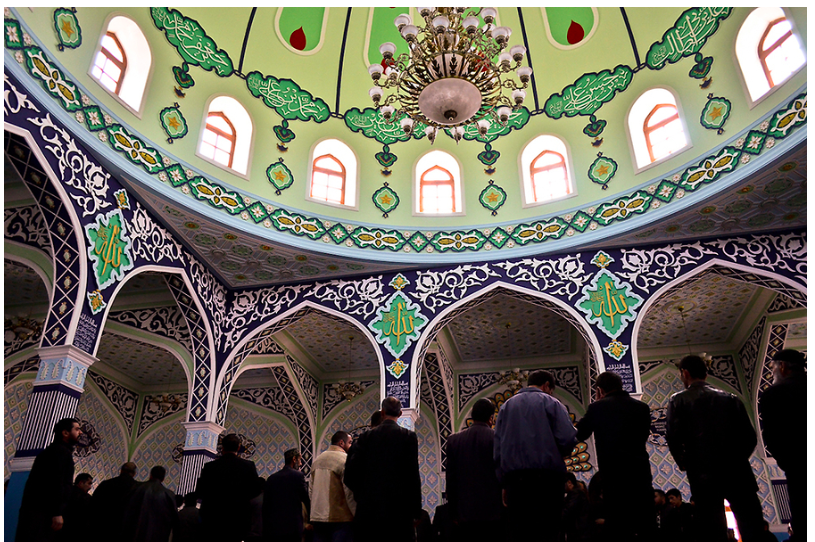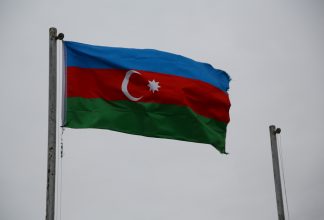Show Trial Ends with Harsh Sentences for Islamic Activists
The trial of conservative Sh’ia religious activists involved in what is known as the ‘Nardaran Affair’ has reached its long-expected conclusion, with all 17 defendants sentenced to up to 20-year prison terms.
All the defendants – 16 members of Muslim Unity, a moderate Islamist group, along with a lone secular opposition politician – were found guilty on a litany of charges ranging from arms trafficking to plotting to overthrow the government.
The case traces its origins to still-murky events in December 2015, when police raided a house in the town of Nardaran, just north of Baku, where a popular Imam, Taleh Bagirzadeh, was leading prayers. Shots were fired – no one can agree on as to the identity of the culprits – but soon after, four locals and two police were found dead.

Chaos ensued, as protesters gathered in the town’s central square, demanding the return of the bodies of the deceased. Authorities subsequently reacted by sealing off the town and arresting many more. Over ensuing days, dozens of alleged Muslim Unity members were arrested nationwide, although press reports indicated that most had little or no knowledge of the organisation.
The official narrative held that Muslim Unity had been caught planning an armed insurrection against the state in order to implement Sharia law. A week into the crisis, the politician Fuad Gahramanli, Deputy Chairman of the opposition Popular Front Party, wrote a post on Facebook criticizing the state’s reaction and blaming underlying social conditions for the unrest in Nardaran, a town with a reputation for being a bastion of religious conservatism.
Gahramanli too was arrested, and on January 25, sentenced to 10 years in prison. Journalists at the court who listened to the five-hour reading of the verdict reported that no substantial evidence was cited other than Gahramanli’s Facebook posts, which are still online and bear little resemblance to the calls to disorder described by the prosecution.
On the final day of the trial, police seemed prepared for violence that never came, as the few hundred protesters who stayed to hear the verdict mainly shouted religious slogans and chanted, while the mothers of the defendants gave fiery interviews to local journalists. The police were apparently ready for anything: pictures circulating on Facebook on the morning of the verdicts showed dozens of police cars blocking the entrance to the courtroom.
The trial followed a well-established pattern, according to rights activists. Over the course of testimony lasting days, the state presented little evidence to support the charges against the defendants, other than confessions extracted from the accused. Outside of the proceedings, independent observers questioned the admissibility of such confessions, echoing the defendants’ assertions that they were obtained via the use of torture.
Meanwhile, testimony from police witnesses was frequently confusing and contradictory. In at least two cases, police officials could not provide a consistent account of when and where the defendants were arrested, raising the possibility that at least some suspects were arrested without due cause.
Defense motions challenging testimony and evidence were repeatedly denied by the court. At one point, many of the defendants engaged in hunger strikes after being barred from attending their own trial.
“The verdict was unlawful and unjustified,” wrote Yalchin Imanov, a lawyer for the defence, in an email interview with Civil Rights Defenders. “This verdict is not in agreement with the constitution, legal code, or criminal or other laws of the Azerbaijani Republic. The decision of the court was based on evidence that was not presented in court.”
The verdict is the latest in a recent line of cases in which high-profile political activists have received lengthy prison terms for seemingly minor offences. In October, for example, members of the NIDA youth movement Bayram Mammadov and Giyas Ibrahimov were each sentenced to 10 years for spray painting political graffiti on a statue of Heydar Aliyev. On January 16, fellow NIDA member Elgiz Gahramanov received a 5-1/2-year term for a Facebook post that was deemed critical of the government. All three reported being tortured while in detention, and like the Nardaran defendants, were convicted largely on the basis of confessions they had subsequently and repeatedly recanted.
Prominent activist and former political prisoner Anar Mammadli described the case as an attempt by authorities to prevent Muslim Unity from joining forces with the mainstream, historically secular opposition.
“We witnessed a very badly organised police operation against non-violent groups, and they were tortured very harshly. I’m concerned it will stop religious groups from becoming involved in the democratisation process for some time,” Mammadli told Civil Rights Defenders.


